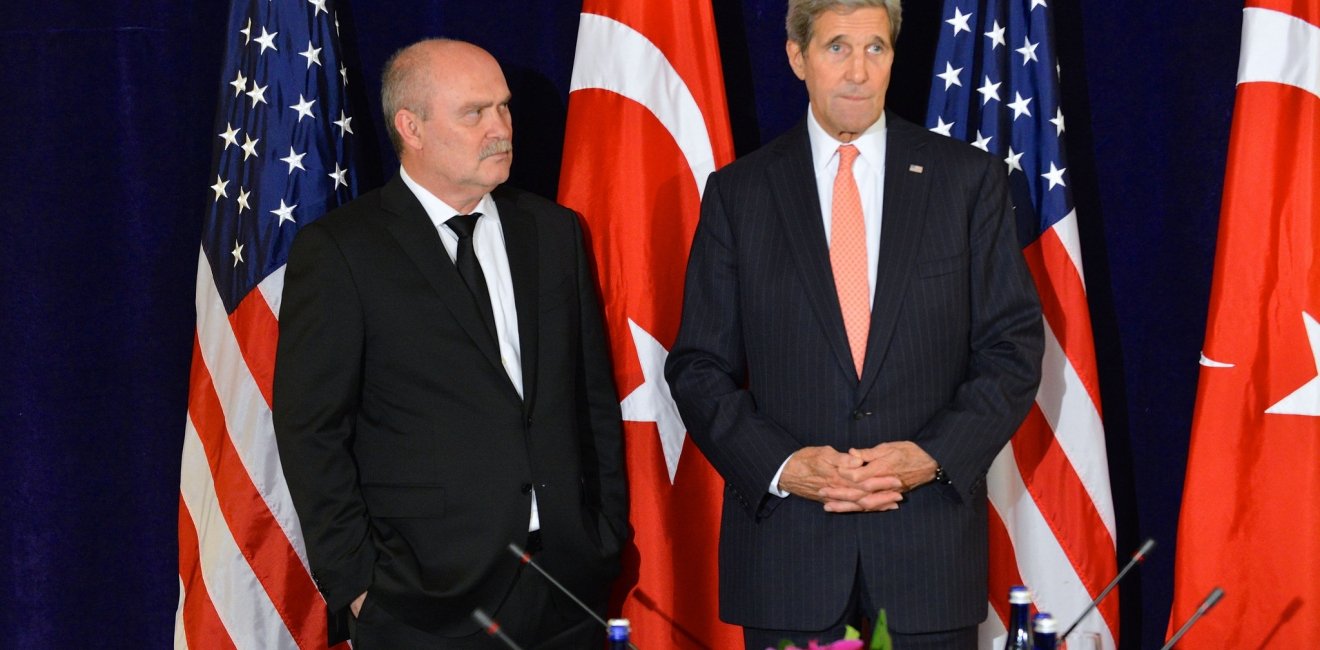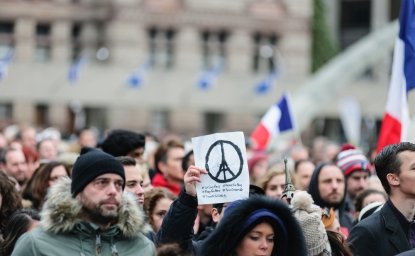The Paris attacks could not have come at a worse time for Turkish president Recep Tayyip Erdogan, who planned to showcase his new electoral victory and complete dominance of the Turkish political scene at the G20 meetings. Instead, the world was focused on the Islamic State of Syria and Iraq (ISIS) and the carnage in Paris. The Paris attacks were bad news for Erdogan, not just because they stole the limelight but also because they put the fight against ISIS to the forefront of just about everybody’s agenda and, paradoxically, strengthened President Barack Obama’s hand.
For Erdogan, the main focus in Syria has been Bashar al-Assad’s rule. He has been adamant in demanding that Assad leave power; overall, Erdogan’s policy toward Syria is the result of a mixture of hubris (that he could dictate terms to his weaker neighbor); retribution against Assad, who failed to heed his advice at the beginning of the Syrian uprising; and sectarianism. Increasingly, Erdogan came to see Assad through the sectarian struggle in the region, and in particular through the fact that the Baathi regime in Damascus had gone to war against the Sunni majority to protect the privileged Alawite minority. If Erdogan wished that Assad would leave soon after the Syrian revolution started, he was to be disappointed. Almost five years later, the regime in Damascus survives, despite Assad’s loss of territory and his need to rely militarily on Russia, Iran, and Hezbollah.
Moreover, the conflict in Syria has given rise to a second problem. The Syrian Kurds, who had most of their rights taken away (including citizenship in many cases) by Bashar al-Assad’s father, Hafiz al-Assad, rose up to assert control of their areas in northern Syria. Syrian Kurds, contrary to expectations that they would align themselves with the official Kurdistan Regional Government, sought to align themselves with the Turkish Kurdistan Workers’ Party (PKK), which both Turkey and the United States have deemed a terrorist organization. The PKK had surreptitiously begun to arm and train its Syrian counterpart, the Democratic Solution Party (PYD), so that the PYD had become the most effective force in northern Syria.
Turkey’s dilemma emerged in October 2014, when ISIS decided to mobilize large amounts of men and materiel to take the Syrian Kurdish border town of Kobani. Although the Pentagon saw the situation as an opportunity not only to defend but, more important, to inflict severe punishment on ISIS forces besieging Kobani, Erdogan objected and made it clear that he preferred to see the PYD defeated—even if by ISIS—rather than see it victorious. This decision spelled the end of the peace process with the Kurds that Erdogan had initiated with the imprisoned Kurdish leader Abdullah Ocalan, and set the Turks on a collision course with Washington. The PYD turned out to be an effective fighting force which, when aligned with the U.S. Air Force, proved to be the only successful ground force capable of defeating ISIS and taking territory away from it.
As the U.S.-PYD relationship deepened, Ankara grew worried. Clearly, Ankara and Washington had started to have very different priorities regarding Syria. For Erdogan, the priority was the defeat of both Assad and the Syrian Kurds, whereas for Washington the main target was ISIS. To prevent further deepening of the American alliance with the PYD, Erdogan reluctantly agreed to open up four air bases to American forces, enabling the U.S. military to operate in close proximity of ISIS strongholds. Still, Turkey exacted concessions from America vis-à-vis its cooperation with the PYD; it severely constrained Washington’s ability to resupply the PYD and limited the PYD’s room to maneuver.
The United States has had a notion but not a strategy on how to defeat ISIS. The carnage in Paris will force the administration to step up to the plate.
After the attacks in Paris, all of this can potentially change. The United States hitherto has had a notion but not a strategy on how to defeat ISIS. Washington knows what it does not want to do—introduce boots on the ground—but does not know what it wants to do. The carnage in Paris is going to force the administration to step up to the plate. Whereas regional powers have done whatever they wanted in the face of U.S. recalcitrance and timidity, now, if Washington were to decide to articulate a medium-term strategy, then Turkey and others would find themselves under pressure.
Paradoxically, the U.S. hand—should it decide to use it—has been strengthened. Europe as a whole can be relied to follow U.S. leadership and therefore Turkey, Saudi Arabia, and others will find themselves pressured to go along. This alignment may mean a greater role for the Kurds. This past week, in the Iraqi mountain town of Sinjar, Iraqi Kurdish forces with American air support dislodged ISIS fighters who had occupied the town and enslaved the Yazidi community there for over a year. Iraqi Kurds, who have excellent relations with Ankara, were aided (despite their own objections) by PKK forces in this operation. This is just another sign that the fight against ISIS is likely to be very complicated, without clear lines of who is friend or foe.
Turkey may come under greater American pressure to clamp down on ISIS networks in its territory, seal its border more effectively, and not interfere with joint operations with Syrian Kurds. Secretary of State John Kerry recently announced that the United States and Turkey would collaborate to seal the last unchecked segment of the Syrian-Turkish border. The ISIS networks in Turkey that the authorities indulged because they were fighting Assad represent a significant threat to not just the Turkish public but also to American and other allied forces there. Three times in the past six months, suicide bombers have targeted Turkish Kurds and their allies, including a devastating attack that killed more than 100 young people in the heart of Ankara.
Turkey, therefore, will have to prioritize the fight against ISIS. This shift in priorities could also help its relations with Europe, which have been frayed of late as refugees began to swarm across the border from Turkey into the EU. The perception that Turkey appeared to be blackmailing Europe for more favorable consideration, including more funding for refugees and high-level visits on the days leading to the Turkish elections on November 1, has rankled the Europeans. After the attacks in Paris, the hardening European stand on refugees will certainly mean that fewer refugees will be allowed in. In turn, Turkey’s burden may increase, especially if the fighting picks up.
If the G20 was intended to be a game changer for Turkish influence and stature, this change did not materialize. Instead, the pressure on Ankara to conform has increased, but in the end it is the U.S. policy which will be determinative. Washington will decide the extent to which its allies will have to change and adapt.
The opinions expressed here are solely those of the author.






